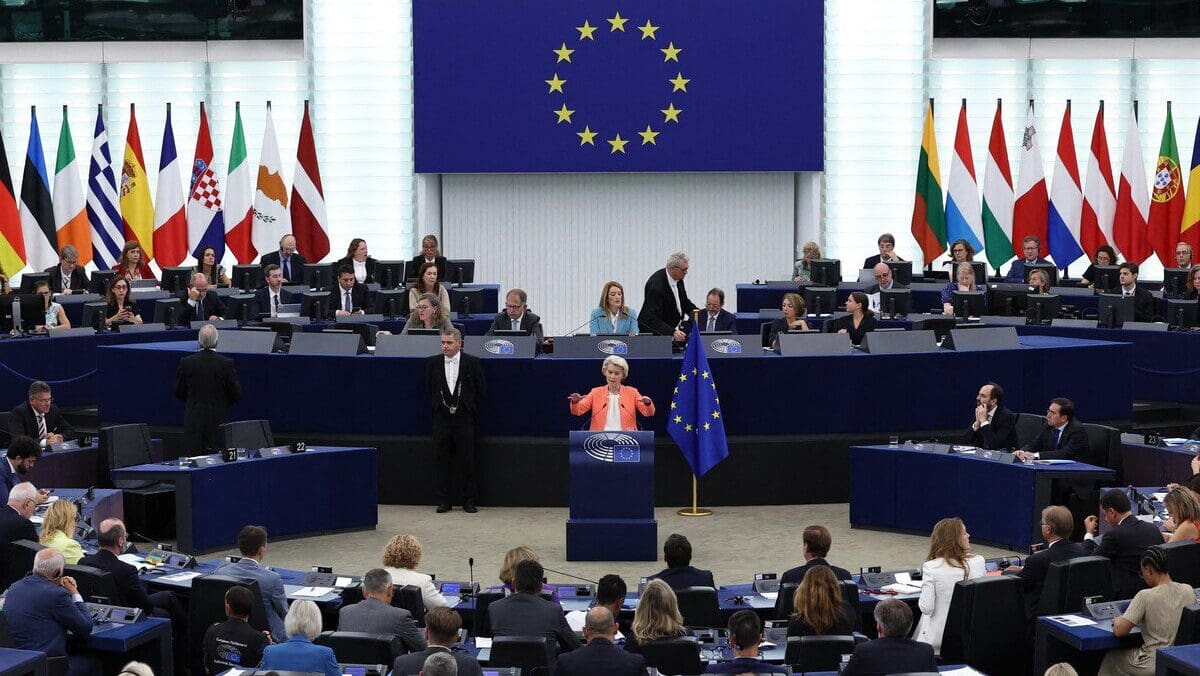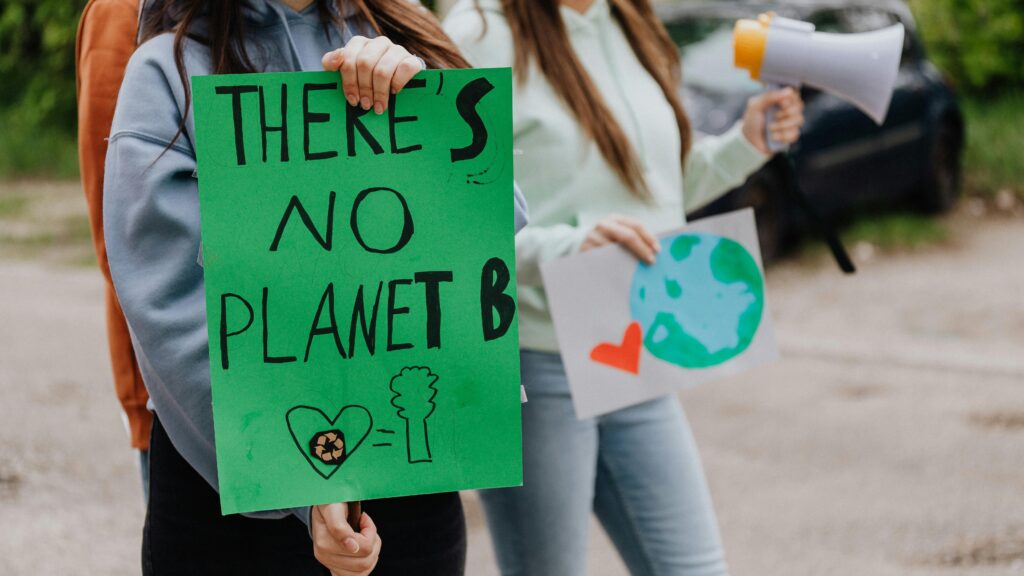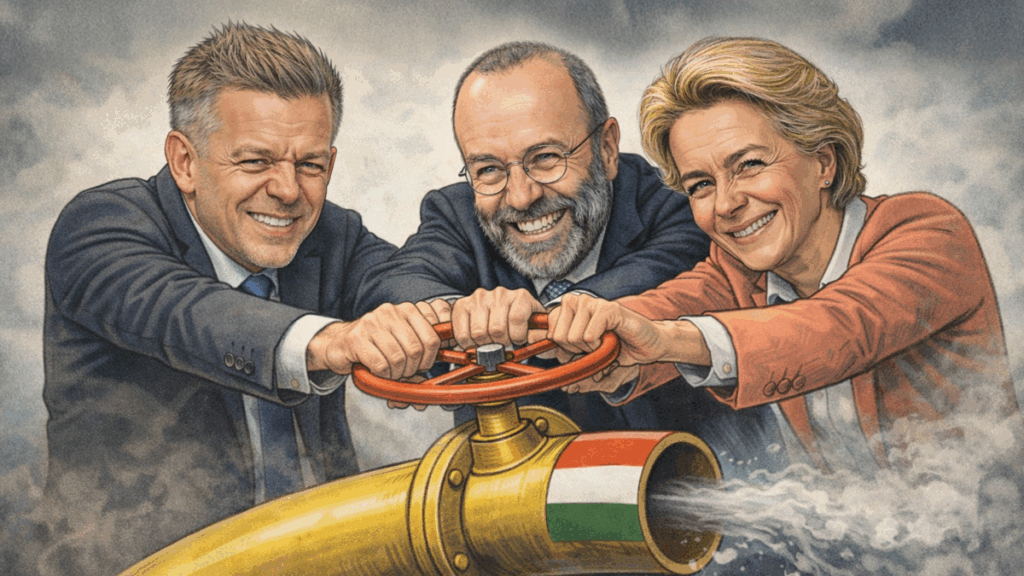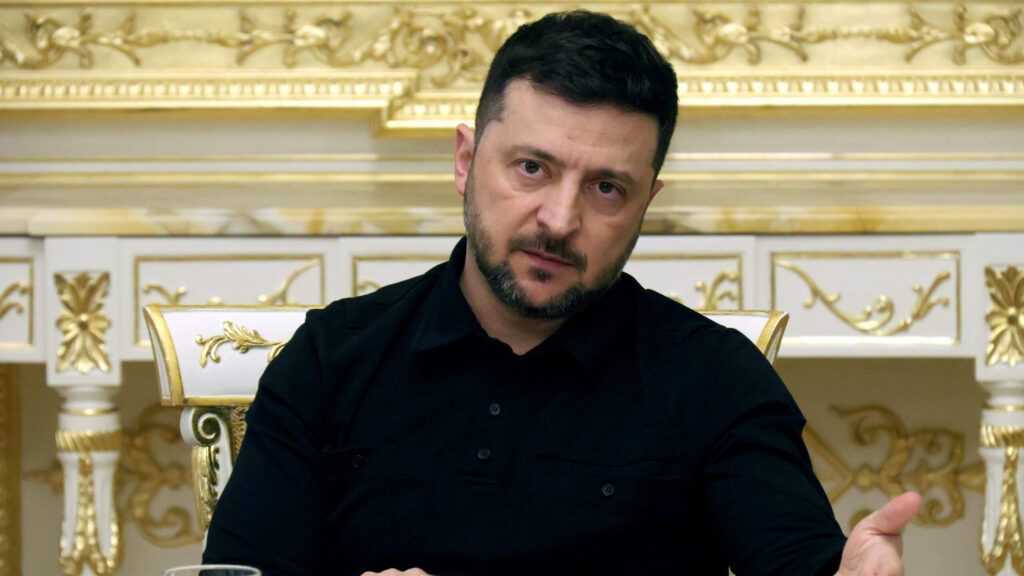The liberal foreign policy of the European Union, and its neighbourhood policy in particular, has failed. A bloody war rages in our immediate neighbourhood on a scale unseen since World War II. The Eastern Partnership is paralysed. 12 years have passed without enlargement—never before has so much time elapsed between two successful rounds of accessions. Relations between the EU and Belarus, Türkiye, Georgia and Azerbaijan have descended into crisis, and the bloc has also fallen into conflict with the two superpowers of our time: the United States and China. All of these crises trace back to one common phenomenon: the totalism of the liberal foreign-policy doctrine and its anachronism. Since the end of American liberal-democratic global hegemony, the liberal school has become incapable of upholding the international order. If the EU is to reclaim a worthy place at the table of major powers, it needs a realistic, pragmatic and smart foreign policy.
The Decline of Liberalism and a New Era of Internationalism
The era of unipolarity—the world-order shaped by the brief global hegemony of the United States—has ended, and a multipolar, or multiplex, international system is taking its place. The transition did not happen overnight, yet one symbolic turning point was in 2008. The global financial crisis severely shook faith in the American model of liberal capitalism, and the global economic axis shifted eastwards toward China, representing the state-regulated capitalism model. Global capital and power distribution have since gone through a dramatic transformation—a kind of re-polarization—for instance, China’s GDP at purchasing-power-parity overtook that of the US, while the BRICS countries now account for about one-third of global merchandise trade, dynamically approaching the scale of the G7.
Since the global free-trade system, rooted in economic liberalism, did not preserve US economic primacy—it rather empowered rivals—Washington began a radical overhaul of international trade relations. The US, the world’s largest liberal economy, after nearly a century, reintroduced protectionist economic strategies. Although the decisive turn came during the first presidency of Donald Trump, from 2016 onwards, both Republican and Democrat administrations have upheld this grand strategy, and unanimously blocked the appointment of new judges of the World Trade Organization’s Appellate Body.
Alongside the shift in economic power came a transformation of international relations. In addition to the European- and American-rooted legal and institutional internationalism, new normative forces emerged in the form of minilateral and regional cooperation mechanisms—such as the BRICS, the Shanghai Cooperation Organization, the Gulf Cooperation Council, the Association of Southeast Asian Nations, or the Organization of Turkic States. The re-globalization of international relations was significantly accelerated by the COVID‑19 pandemic, which—via the example of the World Health Organization—dramatically highlighted the asymmetric distribution of international organizations’ resources, and reinforced around the world the demands for sovereignty, protectionism, and a more just global order. The failure of the Paris Climate Agreement profoundly disillusioned the younger generations, prompting a recognition that the traditional multilateral institutional framework has become inadequate for solving global problems.
International law of war also fell into crisis. Azerbaijan re-established its territorial integrity by force, then dissolved the OSCE Minsk Group. Russia in 2022 launched a bloody war against Ukraine, then suspended participation in the Open Skies Treaty and the New START Treaty. In the shadow of conflict, five EU member states—Poland, the three Baltic states and Finland—withdrew from the Ottawa Treaty on Anti‑Personnel Mines. Pax Americana has ended in Europe, and the international conflict-resolution institutions have failed. We have entered an era of heightened uncertainty, where the rules of engagement are constantly being rewritten. Recognizing this and responding pragmatically is painful, yet existentially necessary for Europe.
The Great European Delusion
In 2018 John Mearsheimer published The Great Delusion, one of the most-quoted critiques of liberal foreign policy. Following the end of the Cold War and the collapse of the Soviet Union, Mearsheimer argues, American global economic and military primacy created a unipolar world order in which liberalism dominated international relations. The objective of US liberal foreign policy was to transform as many countries as possible into liberal democracies, thereby opening their economies and political systems to American capital and political influence. America’s European partners—above all, the UK and the EU—joined this project. Through democracy export, the Euro-Atlantic sphere rapidly expanded: in the 15 years after Germany’s 1990 reunification, the North Atlantic Treaty Organization (NATO) grew by ten additional members; after the 1999 Central European enlargement, three former Soviet republics joined in 2004. A little over a month later, ten former countries of the Eastern Bloc joined the EU. The US liberal-democratic global economic and military primacy enabled NATO and EU eastward expansion, reinforcing the European belief in the universal primacy of liberal foreign policy.
‘Mearsheimer argues that the liberal foreign-policy doctrine was built on a delusion and was bound to fail’
However, Mearsheimer argues that the liberal foreign-policy doctrine was built on a delusion and was bound to fail. While spreading human rights and democratic values is undeniably a morally grounded objective, the idealistic effort ignores the cold logic of the balance of power. If it targets a region where competing political systems also exercise influence, it becomes unsustainable. In such cases, liberal powers often resort to practices of realist foreign policy and hard power while retaining a discursive liberal façade; but if the recognition of realism’s necessity is absent, all that remains is the soft liberal toolkit: the sticks of rhetorical isolation and economic sanctions, and the carrot of democratic institutions and natural-rights promises. According to Mearsheimer, liberal foreign policy thus became globally unsustainable after unipolarity ended—especially so in the case of Europe’s liberal-hegemony programme. The ‘united and free Europe’ project—the idea of an organically and voluntarily democratizing continent and full Euro-Atlantic integration—was, from the perspective of geopolitical realism, infeasible, given the presence of other great powers and competing systems in the European geopolitical space, whose resistance leads inevitably to clashes of power and failure of the liberal foreign-policy paradigm.
Precisely in 2008, the year marking the twilight of unipolarity, the NATO Bucharest Summit declared Ukraine and Georgia for NATO membership. Already back then, many, including German and French government officials, warned that Russia, emerging from the ruins of the Soviet Union, still regarded these territories as within its direct sphere of influence and would respond vigorously to the prospective presence of American troops and/or weapons. Vladimir Putin did not conceal his view: in April 2008 he declared this a ‘direct threat’. To underscore his message’s weight, in August 2008, the Russian army entered Georgia, and Moscow then recognized the independence of occupied Abkhazia and South Ossetia, freezing the territorial conflicts indefinitely and preventing Georgia’s full Euro-Atlantic integration.
The EU also joined the democracy-export programme in 2008. Lacking hard power tools, it resorted to soft means, announcing the Eastern Partnership, which in six former Soviet states (Belarus, Ukraine, Moldova, Georgia, Armenia and Azerbaijan) aimed to improve democratic legal/institutional systems, enhance good governance, and support ‘economic integration and convergence with EU policies’—that is to prepare these former Soviet republics for EU accession. The programme later broadened to include fostering democracy, human rights, the rule of law, sustainability, support of civil society and anti-corruption efforts.
The Failure of Liberal Foreign Policy
But the Eastern Partnership failed: Belarus suspended its participation in the democratic-liberal initiative in 2021, and Azerbaijan cancelled political coordination with the EU due to the bloc’s conduct in the 2020 Karabakh war and its aftermath. While Georgia’s European integration seemed, until 2022, one of the success stories of the EU’s neighbourhood policy, in 2024 the European Council itself froze Georgia’s EU accession process. A bloody war rages on in Ukraine, one cause of which is precisely that the Ukrainian people’s commitment to Europe and democracy was not paired with geopolitical realities and security guarantees—as EU integration has, in most cases, been preceded by NATO membership; thus, the European agenda of liberal hegemony was victimized by assertive hard power measures, the Russian aggression. The uncertain outcome of the war in Ukraine, as a sword of Damocles, still hangs over Moldova’s Euro-Atlantic integration. Last but not least, Armenia’s European perspective is as vague as ever and is bound by serious geographic, infrastructural, economic and security challenges.
The EU’s bilateral relations with Belarus, Georgia and Türkiye exemplify the failure of European liberal foreign policy. Since 1996 the EU has refused to recognize a single Belarusian presidential election as legitimate, which in itself has narrowed the room for political dialogue with Minsk. Yet between 2011 and 2020, bilateral relations steadily improved: in 2016 Minsk implemented a human-rights action plan, after which bilateral visa-liberalization talks began. Nevertheless, following the 2020 Belarus presidential election—marked by obvious and serious abuses—the EU responded with sanctions, economic isolation and rhetorical campaigns—ie, its liberal-foreign-policy toolkit—and bilateral relations plunged to historic lows. Belarus, in turn, forged its closest cooperation in decades with Russia: the 2022 failed Russian assault on Kyiv was launched from Belarusian territory, and the idea of a union state between the two resurfaced.
Until 2022 Georgia had been the EU’s most reliable and closest partner in the entire post-Soviet space. After the outbreak of the Russia–Ukraine war, however, Tbilisi refused to join the EU’s sanctions regime against Russia, which, in the words of Georgian Prime Minister Irakli Gharibashvili, would have been ‘economic suicide’ for the small southern neighbour of the northern giant. Amidst a destabilizing regional security environment and a faltering European partnership, the Georgian government turned to populist domestic reforms in order to shore up internal political stability in what is one of the most conservative and religiously Christian countries in the world, enacting illiberal legislation on family protection and civil-society transparency. The EU’s response was the same as in Belarus in 2020: sanctions and rhetorical campaigns, followed by the EU’s refusal to recognize the results of the October 2024 parliamentary election (conducted via a Dutch electronic system) and the subsequent presidential election. As a consequence, the EU’s normative-political role and influence in the South Caucasus dropped significantly, and an isolated Georgia found itself in an unstable geopolitical environment unseen in decades, forced to stand on its own in defence of its sovereignty in the absence of a Euro-Atlantic deterrent force.
‘The uncertain outcome of the war in Ukraine, as a sword of Damocles, still hangs over Moldova’s Euro-Atlantic integration’
If the deterioration of EU–Belarus and EU–Georgia relations can be regarded as a strategic failure of European foreign policy, then the erosion of EU–Türkiye ties shall very well be interpreted as geopolitical self-mutilation. Türkiye fields the second-strongest military in NATO, and plays a key role in the security of Eastern Europe and the Black Sea region. It controls indispensable transport corridors for stable and secure European supply chains and, as an energy hub, it is vital for the old continent’s energy security. Moreover, Türkiye is the EU’s strategic partner in managing the migration crisis. Yet despite its candidate status of 1999 and the opening of accession negotiations in 2005, bilateral relations have steadily declined in the past two decades, one low point being the 2017 Dutch–Turkish diplomatic crisis when Dutch authorities refused landing permission to Foreign Minister Mevlüt Çavuşoğlu’s aircraft. As the European Parliament has put it: tensions over democracy, human rights and migration have led to a rethink of EU–Türkiye relations—the liberal foreign policy’s totalist doctrine eclipsed the need for a realist, interest-based representation of Europe’s strategic priorities.
The year 2008—marked by the global financial crisis, the Bucharest NATO summit, the Russia–Georgia war and the launch of the Eastern Partnership—also inaugurated a period in which the EU enlarged only once thereafter: with the accession of Croatia in 2013. More than 12 years have thus passed without another successful accession. Enlargement policy has since been held hostage by internal EU power games and interminable debates over European reform of qualified-majority voting. Though in 2022 the enlargement policy regained new momentum, it did so not in its traditional sphere—the Western Balkans, a region that had stalled in the EU’s backroom for 15–20 years—but in war-torn Ukraine and Moldova. Indeed, the European Commission has introduced a two-speed approach and subjected enlargement to a regime of democratic double-standards: while Eastern European candidate countries are slated for accelerated procedures (despite severe crises of press, speech, opinion and religion-freedom and minority-rights), Western-Balkan integration has been relegated to secondary status. That is why the EU and its enlargement policy have been dramatically discredited in the Balkans since 2022: belief in integration has plunged to a multi-year low in Southeast Europe—in Serbia and North Macedonia, majorities now believe their countries will never join the community.
Moreover, the EU has lost credibility not only in its southeastern neighbourhood but globally. After imposing 45 per cent tariffs on Chinese electric-vehicle imports, EU–China relations hit rock bottom. Even the negotiations held to mark the 50th anniversary of bilateral ties ended in embarrassment and without any success, further fuelling distrust between the parties. But the EU has run into serious political-economic conflict not only with China, but also with its foremost ally, the US—the causes, too, must be sought in the incompatibility between the liberal foreign-policy doctrine and the new American transactionalism. Several EU leaders during the US 2024 presidential-election campaign openly backed the liberal Democratic nominee, Kamala Harris, and defined themselves in opposition to the national-conservative alternative represented by Donald Trump—Germany’s Foreign Minister Annalena Baerbock even set up an ‘EU crisis task-force’, to prepare for a Republican victory and to make the EU economy and security ‘Trump-proof’. Following Trump’s sweeping electoral win, the ideologically tinted conflict between Washington and Brussels quickly escalated. US Vice-President JD Vance vehemently criticized the liberal opinion-monopoly in Europe during the Munich Security Conference, and US Defense Secretary Pete Hegseth labelled the European states ‘free-loaders’ of the North-Atlantic alliance. Instead of gestures toward the White House, a diplomatic tit-for-tat erupted between Washington and Brussels, culminating in a tariff deal deeply unfavourable for the EU.
The Dawn of Realist Foreign Policy
Our world has changed, the international order has transformed, and every actor is trying to adapt. With the end of unipolarity, the hegemony of liberal foreign policy also ended—and the United States has acknowledged this shift. Free trade has given way to protectionism; moralizing, value-centric diplomacy has given way to transactional realism. However, this recognition apparently eludes the European Union.
What the EU needs is a realistic, smart foreign policy. Consider EU–Belarus relations. If the EU’s goal is to break the Minsk–Moscow political alliance and improve human rights and democratic institutions in Belarus, the tool cannot be rhetorical isolation and new sanctions—that only produce the opposite of the intended effect. A viable alternative would be to adopt the realist tools of American diplomacy. Washington, for example, extended a gesture of goodwill to Belarus: it lifted US sanctions on the state airline in exchange for the release of 57 political prisoners. What did the EU do? Poland and Latvia closed airspace and land borders with Belarus, and the EU’s High Representative demanded the immediate and unconditional release of all political prisoners, while simultaneously announcing the 19th sanctions package targeting new Belarusian companies. Mearsheimer warned us: sanctions, as foreign-policy coercive instruments, have repeatedly proven ineffective in history—whether with Cuba, Iraq, Venezuela, or smaller economies like Belarus or Georgia. Indeed, economic punitive measures often fuel sovereigntist and/or nationalist backlash and strengthen the internal stability of local governments.
These same considerations should guide the EU’s approach to Georgia, Türkiye, even Ukraine and Russia—and more generally the state of its enlargement and neighbourhood policies. Does the ideological smear campaign and sanctions regime against Georgia actually work? If the objective is to secure the repeal of the so-called ‘family-protection’ laws deemed anti-democratic by the EU, clearly the EU’s liberal foreign policy has failed. Instead, EU–Georgia relations have hit rock bottom, Georgia is isolated and increasingly vulnerable to regional geopolitical interferences. Are the sanctions against Russia working? No—on the contrary, Russian exports increased in 2023 and 2024, and contrary to OECD expectations, the Russian economy grew rather than fell into recession.
One cannot compete in a multipolar world order using soft instruments alone—especially when the multilateral institutional framework sinks from crisis to crisis and brute power dictates the shape of events. This is witnessed by the wartime escalation from the South Caucasus through the Middle East to South Asia—this primacy of hard power has been stressed by both President Ilham Aliyev of Azerbaijan and Prime Minister Benjamin Netanyahu of Israel.
It is time to replace the failed liberal foreign policy with a pragmatic, transactional, realist foreign policy within the European Union. Only then might we break free from economic stagnation and restore our credibility at the world-politics table—and our competitiveness in the global economy.
Related articles:







